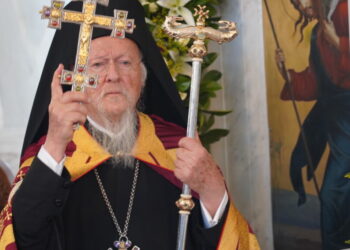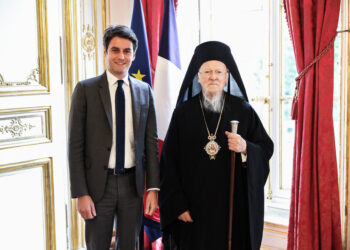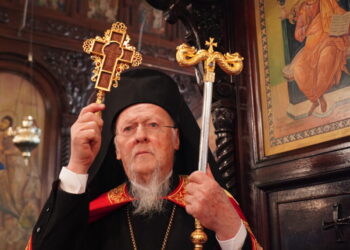Ecumenical Patriarch Bartholomew and Pope Francis attended a roundtable meeting on Tuesday, October 5, at the Vatican’s Clementine Hall to discuss the role of Religion in Education, on the occasion of the celebration of World Teachers’ Day.
The Patriarch and the Pope addressed a greeting, as well as the representatives of all the Churches and Religious Communities that had been invited, together with the competent representative of UNESCO.
In the evening of the same day, the Ecumenical Patriarch attended the dinner given in his honor by Lütfullah Göktaş, Ambassador of the Turkish Republic to the Vatican.
In his inspirational speech, the Ecumenical Patriarch Bartholomew stressed that the authentic teacher is the greatest asset of education, saying, among other things, that the quality of a society’s visions is judged by how it evaluates and organizes the education of the new generation.
Specifically, the Ecumenical Patriarch said, “The education of the new generation is one of the most difficult problems that societies are called upon to solve. In our time, new difficulties are added to the essentially complex task of education, which is connected with the signs of the times. The rapid development of science and technology, the explosion of information and the internet, the phenomenon of globalization and the omnipotence of economic criteria, secularization, socio-political developments, multiculturalism and pluralism, cultural diversity, fundamentalism, etc., create strong shocks in this area, which is fundamental for society and culture. Precious traditions are being shaken, human freedom is being misunderstood as an “art of avoiding commitments”, individualism and legalism are spreading worldwide. In this way, it becomes very difficult to maintain the humanitarian orientation of education and the pedagogical character of the school.”
He also stated that “The presence and proper organization of religious education in the field of education are vital for the future of humanity… Since religion today is often used by fundamentalist circles as a vehicle for divisions and conflicts, proper religious education, as education of peace, is gaining particular relevance. It prepares children and young people to participate in building a world of peace, where man will see in the face of his fellow man the brother and not the insidious or even the enemy.”

















